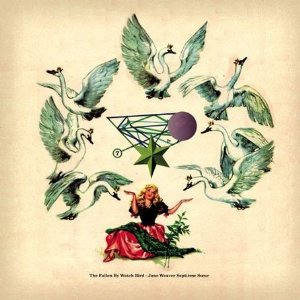Although it may appear an unwise admission… earlier this year I allowed the serious rock critics of Albion to guide me towards Joanna Newsom’s sprawling three CD Have One on Me. Once there, disorientation settled quickly and I soon became lost amid those vast deserts, where undoubted beauty fragmented into a thousand possibilities. Close friends of mine would spend entire evenings negotiating the damn thing. Maybe it was too lovely for me? In truth, I needed and desired constraints, parameters. If I was to be immersed in the unfamiliar, I needed a recognisable boundary or I’d become swamped in sheer looseness.
Tempting as it was to swiftly slap on the first Ramones album – a trick that worked well for me after a particularly harrowing Van Der Graaf Generator album a few years back – I decided to seek something ethereal and rhythmic, lyrically captivating.
The answer should have been obvious, really; though it wasn’t until reading Jude Rogers’ illuminating interview with Jane Weaver that I found the answer. Weaver, I had encountered in – it would seem – a previous life when my ‘owd mucker’ New Order manager Rob Gretton had eased the band Kill Laura, featuring Ms Weaver, onto Polydor. Many bridges and torrents later, Weaver’s latest album sits uneasily among the lazily assembled ‘Manc’ sections in HMV, sharing space with such distant artists as Ian Brown and The Courteeners.
The point is this: find a place where Hawkind might meet the Bay City Rollers. (Two of Jane’s major early influences, evidently.)That might seem a little trite, but the extremes of free freedom and constraint remain extremely relevant within this work, which pushes as many boundaries as, say, Newsom’s Ys, yet at times pulsates to punkish effect.
Perhaps most intriguing of all…this is – that old beast – a concept album. Imbued with a mystical thread that sits closer to The French Lieutenant’s Woman than it might to a Kate Bush album. Ancient passages of estrangement and, eventually a bereavement eased only by the taking of somewhat dubious milk concoction. Therein lies a tale that, itself, seems at once, familiar and aloof.
The great thing here is that you can drift along with this lyrical stream with as much enthusiasm as you wish…or just allow the whole thing to drip gently from your speakers. For sheer musical scope alone, this is an entire acid, folk, world, blues festival in itself, all headily flavoured by more obvious shots of Mancunia, which you might expect from a girl who has worked with Doves, Elbow and Badly Drawn Boy. It also seems hugely significant to note that her husband is Andy Votel, a man who has never shied from the challenge of unlikely musical alliances. Not least his courageous forays into the bomb-laden territory of prog, merging it with folk and aspects of trance. That description might, once again, conjure up visions of Hawkwind and that, as Weaver indicates, is a darker area that lies waiting for her gentle touch.
And after all, this IS a gentle album, despite its omnipresent darkness. Not to everyone’s tastes, either, as Jane constantly pushing at the edge of comfortable noise. Those well-versed in her background will not be surprised. Strong elements of her period within Farfisa female unit, Misty Dixon still provide the heart, driven and dominant aspects of The Fallen by the Watch Bird. It’s just that, freed from a group mentality, is allows herself to float.
Other aspects strike me. Weaver’s life – rather like that of Kate Bush, albeit on a somewhat more modest level – remains grounded in normality. Children, it seems, providing the perfect antidote to aesthetically damaging traces of celebrity. Herein lies the paradox. Punctuated by such mundanely, it is left to the imagination of Weaver, to stretch to truly progressive levels. Well, that’s her quest. It is furthered considerably here and, while modest sales will surely follow, she is slowly forging a powerful and lasting cult appeal.
Still it seems strange to see her nestling amid the Mancs. Then again, as stated, she is from Widnes, a weird and coldly evocative town on the outer ring of Merseyside, where Cheshire softens the identifiable tones, leaving her free in that aloofness. Not a Manc nor a Merseysider, but from somewhere else entirely, musically and geographically aloof. There’s existential for you.


